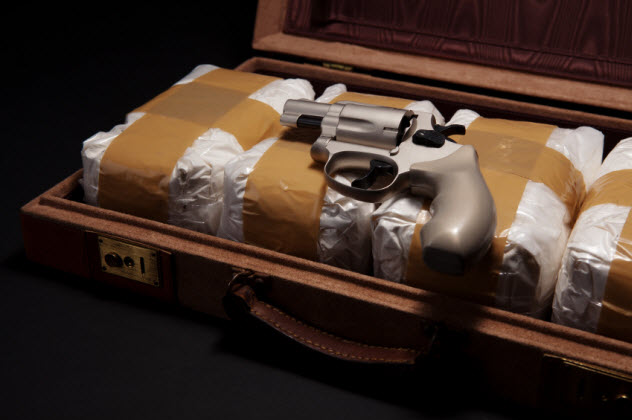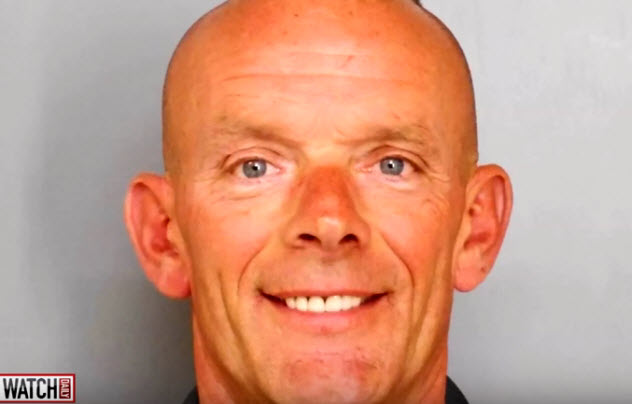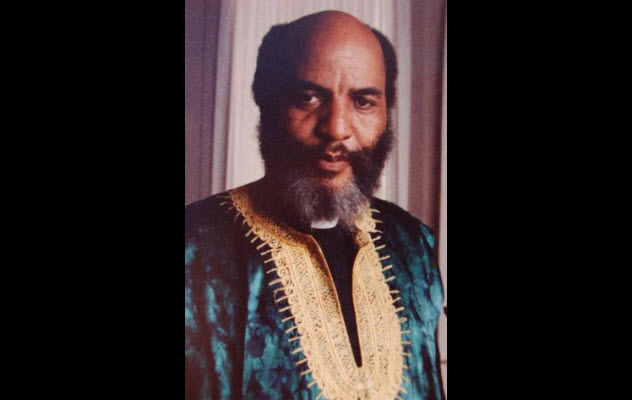 Weird Stuff
Weird Stuff  Weird Stuff
Weird Stuff  Mysteries
Mysteries 10 Tragic Disappearances and Deaths in Joshua Tree National Park
 History
History 10 Ways Childhood Really Sucked in the Old West
 Music
Music 10 Name Origins of Famous Bands from the 1990s
 Religion
Religion 10 Biggest Turnarounds by the Catholic Church
 Weird Stuff
Weird Stuff 10 Unbelievable Times Laws Had Unintended Consequences
 Humans
Humans Ten Historic Women Who Deserve Way More Credit Than They Got
 Movies and TV
Movies and TV 10 Films That Spawned Major Lawsuits
 History
History Ten Times Towns Were Wiped Off the Face of the Earth
 Creepy
Creepy 10 of the Most Disturbingly Haunted Public Houses in the UK
 Weird Stuff
Weird Stuff 10 Niche Subcultures That Are More Popular Than You Might Think
 Mysteries
Mysteries 10 Tragic Disappearances and Deaths in Joshua Tree National Park
 History
History 10 Ways Childhood Really Sucked in the Old West
Who's Behind Listverse?

Jamie Frater
Head Editor
Jamie founded Listverse due to an insatiable desire to share fascinating, obscure, and bizarre facts. He has been a guest speaker on numerous national radio and television stations and is a five time published author.
More About Us Music
Music 10 Name Origins of Famous Bands from the 1990s
 Religion
Religion 10 Biggest Turnarounds by the Catholic Church
 Weird Stuff
Weird Stuff 10 Unbelievable Times Laws Had Unintended Consequences
 Humans
Humans Ten Historic Women Who Deserve Way More Credit Than They Got
 Movies and TV
Movies and TV 10 Films That Spawned Major Lawsuits
 History
History Ten Times Towns Were Wiped Off the Face of the Earth
 Creepy
Creepy 10 of the Most Disturbingly Haunted Public Houses in the UK
10 Heroes Who Lived To See Themselves Become The Villains
When Harvey Dent famously said in The Dark Knight, “You either die a hero or live long enough to see yourself become the villain,” he was clearly on to something and not just because he foreshadowed his transformation into Two-Face. Human nature is so malleable that those we call heroes one day are bound to falter the next. Some will fall from grace entirely—and sometimes, their descents are especially repugnant.
10 Scores Of 9/11 First Responders
For all the sorrow that the 9/11 terrorist attacks caused, they also brought out humanity’s best. Thousands of policemen, firefighters, and others raced toward suffocating dust, toxic debris, and intense flames in a frantic bid to save lives. Hundreds died in the process, and thousands who survived were left with respiratory diseases, heart disease, post-traumatic stress disorder (PTSD), and cancer. Forever marred by their own bravery, many were forced to retire and live on government benefits. But more than a decade after their lifesaving sacrifices, scores of police officers and firemen from the 9/11 rescue effort were accused of soiling its memory.
In 2014, more than 100 retired New York police officers and firefighters were charged with bilking the US government out of hundreds of millions of dollars in a large-scale Social Security scam. More than half of those fraudsters were people who exaggerated their disabilities from rescuing people on 9/11. Cases included men who had presented themselves as barely functioning human husks, but they were later found teaching martial arts, golfing, sailing, or blazing across town on motorcycles without a trace of the disabilities they had described. The perpetrators received tens of thousands per month in benefits with some netting a total of $500,000 each.
At the heart of the callous scheme were four men—including a disability consultant and a former FBI agent—who instructed the former first responders on how to fake ailments during the disability screening process. They allegedly taught their students how to fail memory tests, feign PTSD symptoms, and portray an existence in which basic activities were uphill battles. In truth, their greatest disability was a malfunctioning moral compass.
9 Mark Jakubek

During the 9/11 terror attacks, the World Trade Center became the site of history’s worst elevator disaster. When planes torpedoed the towers, elevator cables were severed, sending occupants plummeting to their deaths. Flames surged through elevator shafts, killing some of those trapped in stalled elevators. Others were sealed inside the lifts until the towers’ fatal collapse. In all, elevator-related peril claimed at least 200 lives. But two people were spared largely because of Mark Jakubek.
Jakubek worked for the Port Authority and was in the building when the planes hit. As he and some coworkers bolted down the stairs toward safety, they were soon stopped by the distressed cries of two people trapped in an elevator. Jakubek was instrumental in freeing the captives and getting them to safety. He was a bona fide lifesaver and was rightfully praised for his actions. But that’s not the only thing for which Jakubek will be remembered. In 2009, he was busted for helping to enable a scheme to illegally profit from the post-9/11 cleanup effort.
With colleague Anthony Fontanetta, Jakubek turned a blind eye to the devious practices of Specialty Service Contracting, Inc. in return for various payoffs. The company, tasked with disposing of smashed cars, debris, and asbestos, charged for phantom workers and trumped up equipment costs, reaping tens of thousands of unwarranted dollars. In turn, Fontanetta and Jakubek received concert and sporting event tickets, cushy jobs for family members, and use of fancy vacation homes.
In September 2011—just days after 9/11’s 10-year anniversary—Jakubek was sentenced to one to three years in prison for profiting from the tragedy’s costly aftermath.
8 Daniel Vaughan

On March 20, 1993, Houston police officer Daniel Vaughan had the option of not reporting for work after a special assignment got called off. Ever the dutiful trooper, he showed up anyway on behalf of an ailing colleague. That day, 22-year-old Gilbert Smith entered the precinct in search of a police lieutenant. With none available, Vaughan volunteered his services. That’s when Smith whipped out a gun and unleashed a hail of bullets. Vaughan sustained shots to his right eye, nostril, and mouth.
Fifteen surgeries and six months of recovery later, Vaughan had gone from violent tragedy to human triumph. The media reveled in the tale of a grievously wounded officer who played catch with his father in the hospital while recovering. With brain damage that forced him to walk with a cane, the loss of one eye, and the loss of hearing in one ear, Vaughan remained unbowed. During his first public appearance after the shooting, he tossed the first pitch at a Houston Astros game in front of an emotional crowd. Later, Vaughan lifted other people’s spirits as a motivational speaker. But this feel-good story turned ugly in 2014 when Vaughan was ensnared in a child sex scandal.
Vaughan had been renting out living space in his Brazoria County home to a father and daughter. Over time, he and the father had become chummy enough to share their interests, which included molesting children. Vaughan’s tenant had been violating his own daughter for years, and Vaughan eventually joined in by exposing himself to her. The sexual torture was uncovered when the daughter made a distressed social media post detailing the abuses by her father, Vaughan, and at least two other people. Her father received a 50-year prison sentence. The disgraced officer, who pleaded guilty, received eight years.
7 Mark Rothwell

Mark Rothwell didn’t feel like a hero in March 2010, but everyone around him disagreed. An Englishman living in Portland, Oregon, Rothwell was planning a trip to England and visited a Chase bank to ask about the dollar-to-pound exchange rate. Suddenly, a man packing a faux pistol barged into the building and demanded money from the teller. Not realizing the gun was a fake, Rothwell leaped at the unprepared crook and subdued him until police arrived. When interviewed about his spontaneous heroism, he replied, “There are times to do nothing, and there are times to act.”
Rothwell’s bravery earned him media attention and a medal from the Portland police. But it wasn’t the only time he found himself on the scene of a bank heist. Five years after he had so gallantly saved the day, Rothwell waltzed into another Portland bank and promptly proceeded to rob it at gunpoint. He left his face and a distinctive neck tattoo completely exposed as he trained a 9 mm Beretta on two tellers before making off with $15,703.
Rothwell had become unglued over the years, immersing himself in drugs and marital infidelity. Allegedly “out of his mind,” he decided to hold up a bank. The crime-stopper-turned-criminal was quickly identified by surveillance footage and didn’t put up a fight when confronted by police. In September 2015, he admitted his crime before an Oregon judge and his weeping wife and children. He was sentenced to seven years in prison with subsequent deportation.
6 Peter Thorneycroft

On February 7, 2009, 400 fires decimated significant swaths of Victoria, Australia. Known as the Black Saturday Bushfires, the various infernos devoured 2,100 residences, ravaged 4,400 square kilometers (1,700 mi2) of land, and killed 173 people. Amid the bedlam, a shirtless do-gooder inspired Aussies around the country. At the National Park Hotel in Melbourne, ferocious flames threatened the 20 people crowded inside. But 43-year-old Peter Thorneycroft rushed to their aid wearing nothing but shorts and flip-flops.
Thorneycroft, a tiler and plumber by trade, climbed onto the roof of the building and kept the blaze at bay with buckets of water sent up by people below. Meanwhile, cars exploded, and nearby buildings succumbed to the huge fire. It was the kind of valor most people could only dream of displaying, which made it all the more disheartening when Thorneycroft was outed as a serial burglar in 2012.
After rocketing to national notoriety, Thorneycroft’s life fell to pieces. He struggled with drug addiction, a failing marriage, and post-traumatic stress resulting from Black Saturday. Unfortunately, his coping strategy was to embark on a burgling binge. In one instance, he cleared a home of over 300 items worth over $100,000. Before he was finally identified by DNA traces at the crime scenes, Thorneycroft made off with $150,000 of antiques, clothing, furniture, and other items.
In November 2012, he was sentenced to 15–24 months behind bars.
5 Simon Ford

On July 7, 2005, four men armed with explosives laid fiery siege to London’s transportation systems. Three men boarded London Underground trains, and the fourth climbed aboard a double-decker bus. When the smoke cleared, 52 people had died, and hundreds more were physically and mentally harmed.
On that day, fireman Simon Ford took part in the daring rescue of a critically injured man trapped in the exploded double-decker. Desperate to save the passenger, he and a fellow fireman pulled away wreckage with their bare hands. Once freed, the man seemed as if he would die in his rescuers’ arms, but he survived another week. In total, 13 people died. Ford’s conduct that day earned him a fire brigade gold award, but the experience eventually left him unglued. A onetime drug addict, his inability to cope with the horrors of the bombings sent him back to the world of drugs, this time as a big-time trafficker.
Ford smuggled cocaine by canoe and stored it in his home as part of a multimillion-pound drug ring. They operated mainly out of a taxi garage used to launder the group’s dirty earnings and distribute coke. In 2008, Ford was arrested and later sentenced to 14 years in prison.
4 Charles ‘G.I. Joe’ Gliniewicz

In September 2015, an army of 400 police officers converged on Fox Lake, Illinois, to find the men who had allegedly gunned down one of their own. Fifty-two-year-old Charles Joseph Gliniewicz, lovingly nicknamed “G.I. Joe,” had spent 17 years in the army as a soldier and reservist, with eventual promotion to first sergeant. Eventually, he became the face and spokesman of the Fox Lake police department and encouraged youngsters to become cops through the Police Explorers program. He received numerous honors and became a beloved fixture of Fox Lake. But now he was gone, supposedly snuffed out in pursuit of three dangerous criminals.
This is how Gliniewicz likely wished to be remembered, which may be why the local role model—whose passing was mourned by thousands—framed his suicide to look like a heroic death. In reality, G.I. Joe hadn’t been fighting crooks but trying to hide the fact that he was a snake in the grass. For years, he had been siphoning money from the Police Explorers youth initiative. When he came under scrutiny and was bound to be caught, Gliniewicz used his prior experience in staging crime scenes to pass off self-inflicted gunshot wounds as a homicide.
Further investigations into his conduct uncovered greater darkness. Roughly a dozen years before his embezzlement was revealed, Gliniewicz had been accused of sexually harassing a female colleague in 2003. That same year, he had allegedly threatened to make a dispatcher disappear. These shades of aggression and coercion reemerged much later when G.I. Joe suspected that his financial chicanery was coming under scrutiny. According to texts sent from his phone, the dirty cop wanted to hire an assassin to silence an administrator who could have exposed him.
As authorities have continued investigating Gliniewicz’s corruption, G.I. Joe’s once-rosy portrait has only gotten uglier. In 2015, it was revealed that the former serviceman had been illegally hoarding military weapons.
3 Joseph Hunter
Before people knew him as “Rambo,” Joseph Hunter was an American sniper. Between 1983 and 2004, the army soldier and eventual sniper instructor earned various medals for service in Puerto Rico, Panama, and Germany. After retirement, Kentucky native Hunter was honored as a “Kentucky Colonel,” signifying “outstanding service to a community, state, or the nation.”
But while the military brought Hunter honors and purpose, civilian life left him derelict and anxious. Few employers wanted anything to do with the decorated soldier, and he soon resigned himself to working with a private security firm based in Iraq. During that time, Hunter met a mercenary who put him in touch with intercontinental arms dealer and drug baron Paul Le Roux. Le Roux enlisted Hunter to watch over his illicit cargo and allegedly perform assassinations. When Le Roux was apprehended by DEA agents in 2012, he purportedly offered Hunter as a sacrificial lamb.
DEA agents devised a sting operation to snag Hunter. Pretending to be Colombian drug cartel members, they reached out to the hired gun to head up their security detail and take out enemies. Eager to take on the task, Hunter cobbled together a merry band of murderers, former soldiers from different countries with a hunger for blood and money. They jumped at a fake assignment to kill a DEA agent and an informant. During recorded conversations, Hunter admitted to killing two other people while performing similar work.
Before the group could carry out their plan, authorities pounced. In 2015, Hunter pleaded guilty to conspiracy to murder a law enforcement officer.
2 William Hanhardt
William Hanhardt was a Hollywood fantasy in the flesh—a gruff Chicago police officer with almost supernatural powers of recall and seemingly limitless courage. As private investigator Ernie Rizzo said, “He was a hardcore guy.” Hanhardt was the kind of man who hunted down brutal thugs with a gun and interminable grit, a man so good at stopping the bad guys that he received a commendation from J. Edgar Hoover himself. Hanhardt’s experience and accolades earned him a consulting job on the show Crime Stories, which featured a dynamic detective fashioned after him.
He made a name for himself in the 1960s with stellar police work, eventually landing a post as police captain. But as time went on, there were warning signs that the supercop had gone to the dark side. Hanhardt became too good at nailing crooks, sometimes identifying perps within hours of their crimes. People floated rumors that the gilded officer was in league with mobsters, and Handhardt was suspected of tipping some of them off about an FBI investigation in the late ‘70s. Nevertheless, he remained untouchable and respected for decades.
Hanhardt’s minor celebrity ultimately made it exceedingly easy for him to mastermind a jewelry heist ring. After retirement, he used his sway with the force to access a national database of vehicles owned by jewelers. This allowed Hanhardt’s minions to track the jewelers and execute sophisticated thefts. Over two decades, they stole $5 million of gems.
But for all his law enforcement smarts, the cop-turned-robber didn’t realize that he was being bugged by the FBI. In 2001, Hanhardt pleaded guilty to his crimes and was sentenced to 12 years behind bars.
1 James Bevel

His resume was the stuff of legend: confidant to Martin Luther King Jr., organizer of the Birmingham children’s movement that garnered public support for the civil rights movement, and one of the driving forces behind the voting rights march from Selma to Montgomery. In the eyes of some, Reverend James Bevel was a “creative genius” who was “more inventive” than Dr. King. Bevel has had an outsized influence on critical chapters of American history. But his legacy is tarnished by unthinkable acts.
For all his brilliance, Bevel harbored some incredibly batty beliefs. The former project coordinator for the Alabama branch of the Southern Christian Leadership Conference, the reverend was allegedly ousted from the organization for such gross misconduct as coercing Spellman College students to drink his urine as a show of loyalty. But it was Bevel’s philosophy on sex education that demonstrated his most monstrous behavior. Bevel was a self-avowed proponent of giving children hands-on lessons about sexual activity, a worldview he practiced on his own daughters.
According to daughter Jamese Machado, Bevel began molesting her when she was six years old, and it persisted for years. She wasn’t alone. At a 2004 family reunion, several of his adult daughters relived the horrors of sexual abuse at their father’s hands, which Bevel excused as an instructional exercise. Machado reported Bevel to authorities in 2005, and an investigation ensued. During a recorded conversation, Machado got her father to admit that he once asked her to use a vaginal douche after abusing her to prevent pregnancy. Bevel also admitted in court that he had fondled his daughter’s chest “in an educational context.”
In April 2008, a Leesburg, Virginia, jury found Bevel guilty of incest. He received a 15-year sentence but was released in November for medical reasons. That December, he died of pancreatic cancer.








